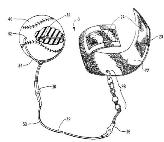Indianapolis; IN – Trademark attorneys for JacobsParts, Inc. of Indianapolis, Indiana filed a trademark infringement suit in alleging United Integral, Inc. of Temple City, California infringed trademark registration nos. 85405544,85567855,7725369 and 85575355 for the marks JPQuality and JacobsParts, which have been issued by the US Trademark Office.
The complaint states that JacobsParts sells computer and office supplies and that a vast majority of its sales are through amazon.com. United Integral is alleged to also sell computer and office supplies through amazon.com. The complaint alleges that at an unknown time, United began describing itself on amazon as selling products bearing the JPQuality![]() and JacobsParts marks. The complaint alleges United claims to offer these trademarked goods at lower prices than JacobsParts does. The complaint states that United’s unfair practices result in its products being listed first when customers are searching for the specific parts on amazon. It further alleges that United then sends customers generic and non-trademarked parts, which are lower quality, in an attempt to “pass off” its products. JacobsParts has included a list of the allegedly infringing products, which consists mainly of mobile phone cases, styluses, chargers and cables. The complaint seeks a declaration of infringement, an injunction, actual and treble damages, costs and attorney fees.
and JacobsParts marks. The complaint alleges United claims to offer these trademarked goods at lower prices than JacobsParts does. The complaint states that United’s unfair practices result in its products being listed first when customers are searching for the specific parts on amazon. It further alleges that United then sends customers generic and non-trademarked parts, which are lower quality, in an attempt to “pass off” its products. JacobsParts has included a list of the allegedly infringing products, which consists mainly of mobile phone cases, styluses, chargers and cables. The complaint seeks a declaration of infringement, an injunction, actual and treble damages, costs and attorney fees.
Practice Tip: The complaint makes only a bare-bones allegation of facts that would establish personal jurisdiction over Defendant United Integral in Indiana, “as a result of business regularly conducted by the Defendant within the State of Indiana.” Despite the allegation that United Integral sells products on “Amazon.com,” apparently JacobsParts did not make a purchase and have it shipped to Indiana before filing a complaint. Making such a purchase before filing a suit increases the chances of obtaining personal jurisdiction in Indiana.




